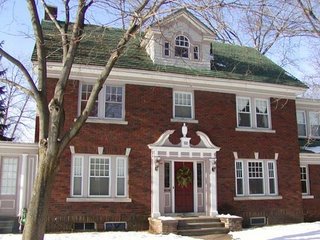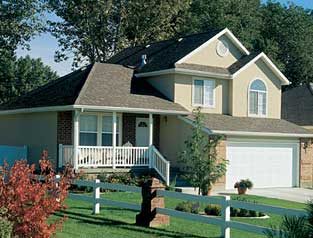Practicing what they preach?
It always amuses me to hear public officials praise mass transit and walkable communities. Of course those are good things, but honestly, when was the last time you saw your city's mayor waiting at a bus stop? Do your city council members walk or use mass transit to get to the store/work/church/city hall on at least a semi-regular basis? Probably not.
But then again, that would make our local leaders about the same as everyone else, so it's not fair to hold them to a higher standard.
Did I read somewhere that Utah County might not get commuter rail until 2030, and that during upcoming construction on I-15, they're going to have temporary passenger train service to get Utah County commuters into SLC? I'm so glad I don't live in that poorly planned, sprawling monstrosity, otherwise known as northern Utah County. I don't see why anyone in their right mind would want to live in American Fork and work in downtown SLC. I know some people really like the city they grew up in, or their dream house they built (even if it's poorly designed with pinkish bricks, grey stucco and a few other mismatched architectural features arranged asymmetrically), but I just don't think that it's worth spending two hours sitting in my car each day.
And no, I'm not an architecture snob. I just don't understand why people will spend $350,000 to build a new house and not build it with a more timeless design.
Good design:

Not-so-good design:

But then again, that would make our local leaders about the same as everyone else, so it's not fair to hold them to a higher standard.
Did I read somewhere that Utah County might not get commuter rail until 2030, and that during upcoming construction on I-15, they're going to have temporary passenger train service to get Utah County commuters into SLC? I'm so glad I don't live in that poorly planned, sprawling monstrosity, otherwise known as northern Utah County. I don't see why anyone in their right mind would want to live in American Fork and work in downtown SLC. I know some people really like the city they grew up in, or their dream house they built (even if it's poorly designed with pinkish bricks, grey stucco and a few other mismatched architectural features arranged asymmetrically), but I just don't think that it's worth spending two hours sitting in my car each day.
And no, I'm not an architecture snob. I just don't understand why people will spend $350,000 to build a new house and not build it with a more timeless design.
Good design:

Not-so-good design:


6 Comments:
I didn't know that we were in energy trouble until a few years ago when I encountered a peak oil post while I was shopping online for a new minivan. I try not to be judgemental of those not yet aware because just 2 years ago I was one of them. Billions are spent on selling cars, trucks, and suburban real estate. Almost nothing is spent on trying to make people aware that buying into that lifestyle might be a problem. So you can't blame people for not knowing.
As far as leaders not practicing what they preach, it reminds me of when I went to the governor's transportation summit in Layton last year. The flyer gave exhaustive instructions on how to reach the venue from every possible direction on the freeways, but neglected to mention that several UTA bus routes happenened to converge at a transfer point at the adjacent mall. Not suprising, since the whole thing turned out to be a high pressure sales pitch from the road lobby for a public policy of raiding general funds to pay for highway development.
I think that for many of us, coming to terms with peak oil doesn't just happen overnight. I first heard about it in February of 2005, but I don't think it really started to sink in until I first read Kunstler's "The Long Emergency" last fall. But reading everything on lifeaftertheoilcrash.net (especially the part about agriculture) was the last nail in the coffin.
I don't know about you google, but ever since the reality of peak set in, I've just felt very disillusioned with the world. I grew up thinking that technology would just keep getting more and more advanced, with no end in sight. I assumed that the world would become a more stable place as time went on, and that hardship, physical labor, and etc. were just things of the past, never to be returned to again.
But when you look at the world in light of peak oil, you see everything differently. You start wondering how your community could grow its own food. You're humbled by the possibility that you may never fly on an airplane again. And the list goes on.
It seems to me that even those people who have heard about peak oil don't want to accept it. Kunstler puts it so aptly at the beginning of his book with that quote from Jung - "people cannot stand too much reality."
Our current situation pretty much falls in line with world history. Civilizations have risen and fallen. Each one has assumed that it could continue perpetually. The fact is that the general populace of any civilization does not do much about significant threat to their way of life until it whacks them between the eyes. Simply reading doom and gloom articles doesn't cut it. Nor does $3/gallon gas. No, it has to become an actual bona fide crisis before people make serious efforts to respond.
The only exceptions to this have been when exceptional leadership has been demonstrated. Nobody is doing that today (really, on any issue; not just this one). But history has frequently proven even exceptional leaders to be in error.
There is also a problem with the doom and gloom viewpoint. It only takes into consideration known factors. It fails to account for our most amazing resource: human ingenuity. Pessimists can argue that human ingenuity is overrated, but there are too many examples of it succeeding for the general populace to discount it at present.
I'll comment on the pics. If your good design home is brick veneer (not 100% masonry which is bad news on the earthquake-ready Wastch Front) well insulated and all those front windows are high efficiency glass and south facing its probably a good example. (at least with the mature trees in front to give shade during the summer).
Your not-so-good example does have a shaded porch, a young shade tree in front and shade trees in back. The grass around the home will cool off the area around the house (while consumming lots of water in our near deseret) while the good example appears to have a brick/concrete oven around it. If well insulated high e glass in the windows this could be a pretty good example.
I'm pointing these things out because I live in an 80 year old brick wonder in Provo that costs more to heat and cool than my sister's new house over twice as big that's 15 minutes away. We have better building materials, even if we have forgotten style and some of the nature heating and cooling methods. We often build without regard to the site and landscaping. We suffer from the "more house give me" mentality instead of improving our life with our home, (including commute, etc).
You raise some good points Matt. Old houses do have problems with being energy efficient. But like you said, it seems that too many people just want a big house, instead of a house that's tastefully designed.
Someone could conceivably build an energy efficient house that still has a lot of traditional design elements. It doesn't have to be one or the other. And of course a smaller home built to be energy efficient is going to use less energy than a large house that's built to be energy efficient. It's easier to keep smaller rooms warmer than cathedral-ceiling entryways.
Congratulations peaknik for recieving a mention on the utahpolicy.com homepage today (3/31). Your blog name means the term "Peak Oil" actually appears on the page. Quite a surprise since Lavarr Webb is an unapolagetic road lobbyist and the whole Peak Oil concept doesn't suggest a bright future for highway building.
Post a Comment
<< Home